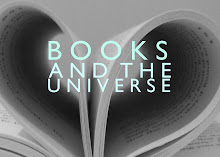
Dear Blog,
Review. I have one.
Summary (from Goodreads): Anax thinks she knows her history. She’d better. She’s now facing three Examiners, and her grueling all-day Examination has just begun. If she passes, she’ll be admitted into the Academy—the elite governing institution of her utopian society.
But Anax is about to discover that for all her learning, the history she’s been taught isn’t the whole story. And that the Academy isn’t what she believes it to be.
In this brilliant novel of dazzling ingenuity, Anax’s examination leads us into a future where we are confronted with unresolved questions raised by science and philosophy. Centuries old, these questions have gained new urgency in the face of rapidly developing technology. What is consciousness? What makes us human? If artificial intelligence were developed to a high enough capability, what special status could humanity still claim?
Review: I've been after this book for a couple of months since I saw this edition of the book- there are several different covers and this is probably one of my favourite. It seems the most symbolic of the nature of the book, or rather to what it really is about: a man and a robot. For instamce, the cover of the edition that I actually read looks like
this, and while nice enough (okay, absolutely beautiful) is actually slightly irrelevant. No. This cover is simplistic and seems to sum things up perfectly.
Genesis is not dystopian fiction, as is all the range in YA nowadays what with
Uglies and
The Hunger Games and such. Nay, quite the opposite. The world in
Genesis seems kind of like the world in Allegra Goodman's
The Other Side of the Island, but seemingly not as sinister and disturbing in an overly-perfect kind of way. You seem to get the impression that despite a few shady goings-on and experimentswith robots, the sealed island, all seems to be functioning well to compared with how things were on Earth before. Speaking of which, I can't tell whether or not I liked the massive dump of information at the beginning of the book. To provide the adjudicators some background, Anaximander basically catches the reader up on what's been occurring on Earth throughout the mid-21st century- Wars, oil crises, disease and bad things, in general. So it's useful to have such a summary, even though it's entirely for the readers' sake.
The writing style is quite unusual. The whole book takes place in a four-hour entrance exam to the mysterious Academy taken by fourteen-year-old Anaximander (I'll get to Anax in a minute). It alternates between a calm, distant sort of third-person and transcripts, which makes for pretty interesting reading. Parts of the book seemed to unfold almost like a film in front of the reader, the ending in particular, which is completely unexpected (I'll also get to that in a minute).
It's kind of hard to talk about Anaximander, mostly because the true protagonist of the story is Adam Forde, Anax's historical hero. Still, you know that Anax is strong, determinded and very intelligent indeed. Read Genesis and be amazed at her speeches and opinions on consciousness that go on occasionally for pages.
Adam is also hugely (and even more) likeable. Perhaps it's because of all the interesting questions that the book asks about humanity, he seems like a perfect example of all that is life. He's clever but foolish, witty but arrogant, confident but headstrong. His flaws and numerous imperfections are actually what make him so perfect a character. I was probably grinning like a twit as I read the deep discussions between him and Art, the robot he stays with for several months, for his sheer perfection and awesomeness.
Speaking of which, you've got to love Art. He's witty and snarky in a hilariously automated sort of way, but not outright entertaining so much as thoughtful at the same time. The dialogue between Adam and Art leaves the reader constantly switching sides. One minute you think that Art's in the right, and then the next Adam has his comeback and you're rooting for him.
There's very little action in
Genesis at all, so it's not thrilling in that sense. But the ideas, the story itself and the big questions about what makes a human human are so intriguing you can't help but devour the book faster than you can say Philosophy. It reminds me a lot of
Sophie's World with all the deep discussions about life and the universe and so on, as well as some of the monologues and longer speeches which seem like Bernard Beckett is asking his own questions, and then thinking up answers for them as he goes along.
The ending was...weird, with a lack of any better description. It was probably the only thing that stops
Genesis being rated a 5. It was kind of rushed, unexplained and "oh. What just happened there?" It's hard to describe without much of what happens being given away. So I'll just leave that a mystery and say: meh. It was a shame that the book had to end like
that.
In Three Words: Refreshing, deep, thought-provoking.
Recommended for: anyone who wants a change from the norm.
Rating: 4.

















